What makes a good philosophy essay?
A good philosophy essay is characterized by clarity of thought, logical structure, depth of analysis, and effective communication. Here are some essential elements to consider when composing a philosophy essay:
Clear Thesis Statement:
- Clearly state your main argument or thesis in the introduction.
- Ensure that your thesis is specific, focused, and directly addresses the essay prompt.
Logical Structure:
- Organize your essay logically with a clear introduction, body, and conclusion.
- Use paragraphs to develop specific ideas, and ensure a smooth flow of thought.
- Each paragraph should have a clear topic sentence that relates to the overall thesis.
Critical Analysis:
- Engage critically with the philosophical issues at hand. Don't just summarize the views of others; provide your own analysis and evaluation.
- Support your arguments with relevant evidence and examples.
- Anticipate and address potential counterarguments.
Clarity and Precision:
- Use clear and precise language to convey your ideas. Avoid unnecessary jargon or overly complex language.
- Define key terms and concepts to ensure your reader understands your arguments.
Consistent Style:
- Maintain a consistent writing style throughout the essay.
- Be mindful of tone and avoid overly informal language.
Thorough Research:
- Demonstrate a solid understanding of the relevant literature and philosophical concepts.
- Cite sources properly according to the citation style specified in the assignment guidelines.
Originality:
- Offer your unique perspective on the philosophical issues. Don't simply restate what others have said.
- Be creative in your approach and consider alternative viewpoints.
Attention to Detail:
- Proofread your essay carefully for grammatical errors, typos, and clarity.
- Ensure that your writing is well-organized, and each sentence contributes to the overall coherence of the essay.
Conciseness:
- Be concise and avoid unnecessary verbosity. Every sentence should contribute to the overall argument or analysis.
Engaging Introduction and Conclusion:
- The introduction should grab the reader's attention, introduce the topic, and clearly state the thesis.
- The conclusion should summarize the main points, restate the thesis, and offer some final thoughts or implications.
Follow Guidelines:
- Adhere to any specific guidelines provided by your instructor, including word count, formatting, and citation style.
By incorporating these elements into your philosophy essay, you can create a piece of writing that is intellectually rigorous, well-structured, and compelling.
What are the essential elements of a well-crafted philosophy essay?
A well-crafted philosophy essay requires several essential elements to be truly effective in engaging with complex philosophical ideas. Here are some of the key components:
Structure and Organization:
- Clear thesis statement: The introduction should present a clear and concise thesis statement that explicitly states the central argument or point of the essay. This statement should be specific and focused, avoiding vague claims or generalizations.
- Logical organization: The body paragraphs should be organized in a logical sequence, following the structure of the argument. Each paragraph should focus on a single point and provide relevant evidence and analysis to support it.
- Strong transitions: Transitions between paragraphs should be smooth and clear, guiding the reader through the flow of the argument.
- Conclusion: The conclusion should restate the thesis statement in a new light and provide a final takeaway message or implication of the argument.
Content and Analysis:
- Engaging with philosophical texts: The essay should demonstrate a clear understanding of relevant philosophical texts and theories. This includes accurate representation of authors' views, key concepts, and arguments.
- Critical analysis: The essay should go beyond simply summarizing existing theories. It should analyze them critically, identifying strengths and weaknesses, evaluating arguments, and offering counter-arguments or alternative perspectives.
- Use of evidence: The essay should support its claims with strong evidence, such as logical reasoning, historical examples, relevant thought experiments, or expert opinions.
- Clarity and conciseness: The writing should be clear, concise, and free of jargon. While technical terminology may be necessary at times, the essay should be understandable to a well-informed reader without needing a background in philosophy.
- Objectivity and fairness: The essay should present different viewpoints fairly and objectively, even if the writer disagrees with some of them. Avoid biased language or personal attacks on other philosophers.
Style and Presentation:
- Formal tone: Philosophy essays typically require a formal tone. Avoid informal language, slang, and excessive contractions.
- Proper grammar and mechanics: The essay should be carefully proofread and edited to ensure proper grammar, mechanics, and formatting.
Additional elements:
- Citations and references: All sources used in the essay should be properly cited and referenced according to the required style guide.
- Originality: While engaging with existing scholarship is crucial, the essay should also contribute something original to the discussion. This could be a new interpretation of a classic text, a novel argument, or a unique perspective on a philosophical issue.
By incorporating these essential elements, you can craft a well-written philosophy essay that demonstrates critical thinking, deep understanding of complex concepts, and a clear and concise writing style.













